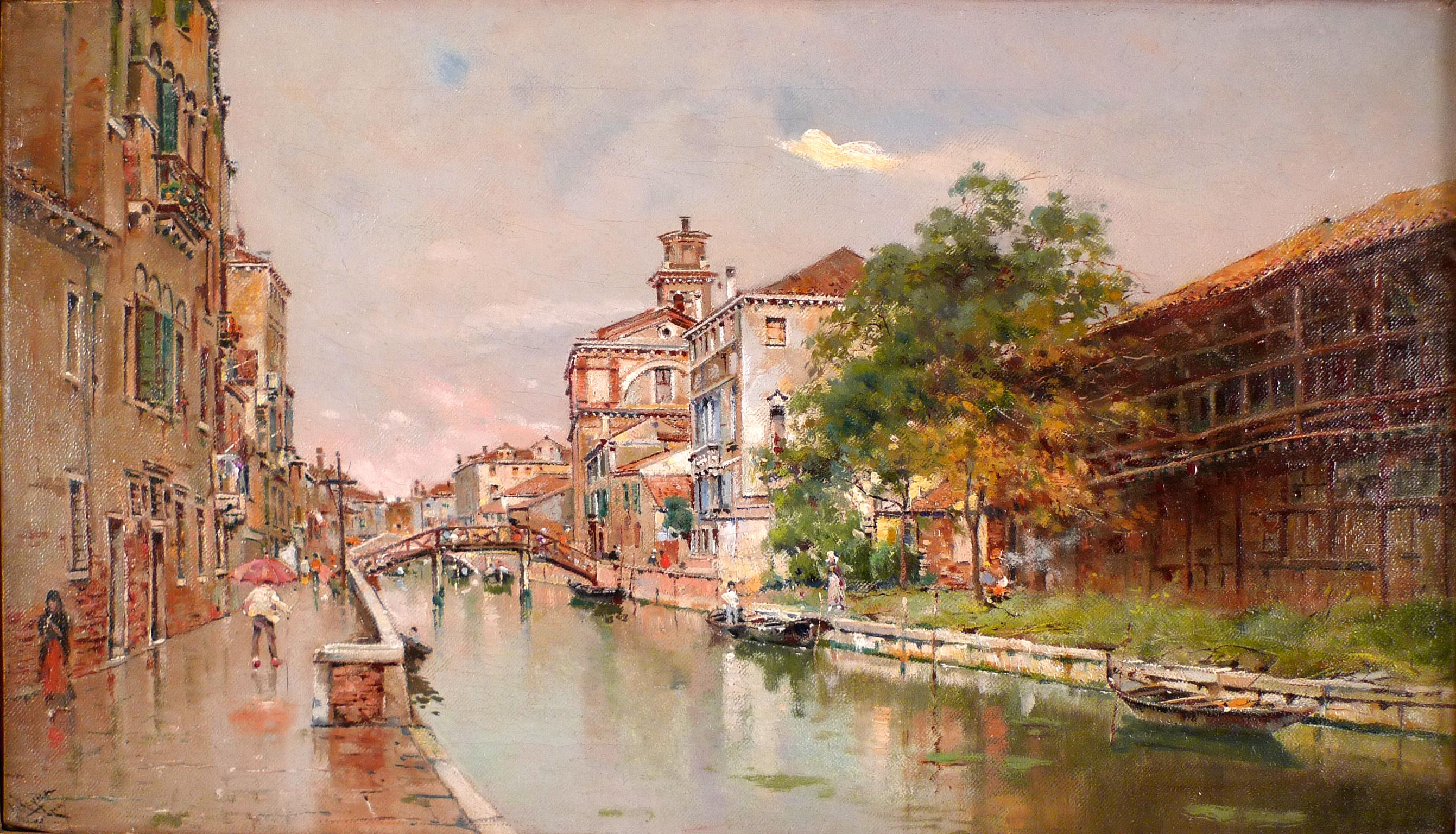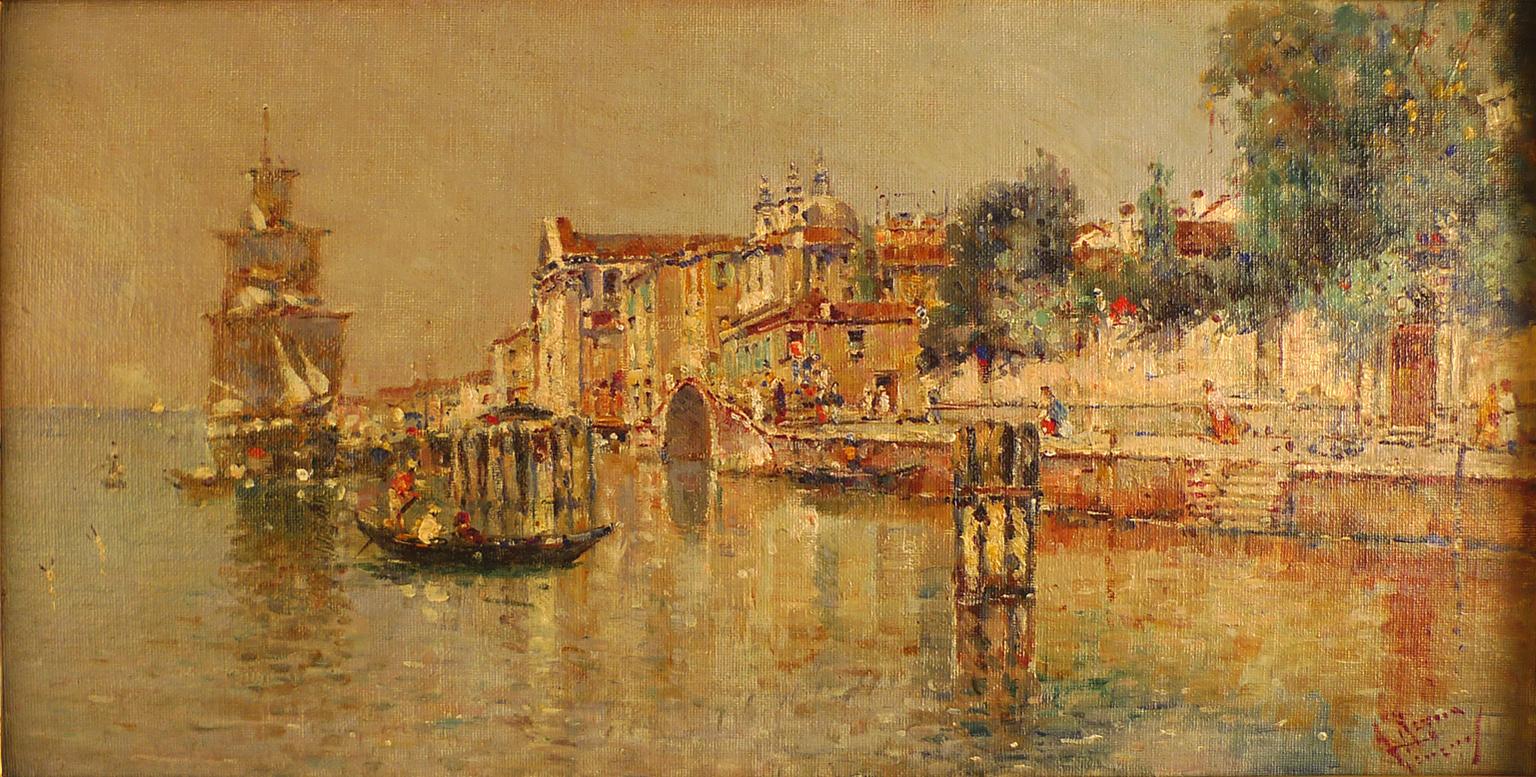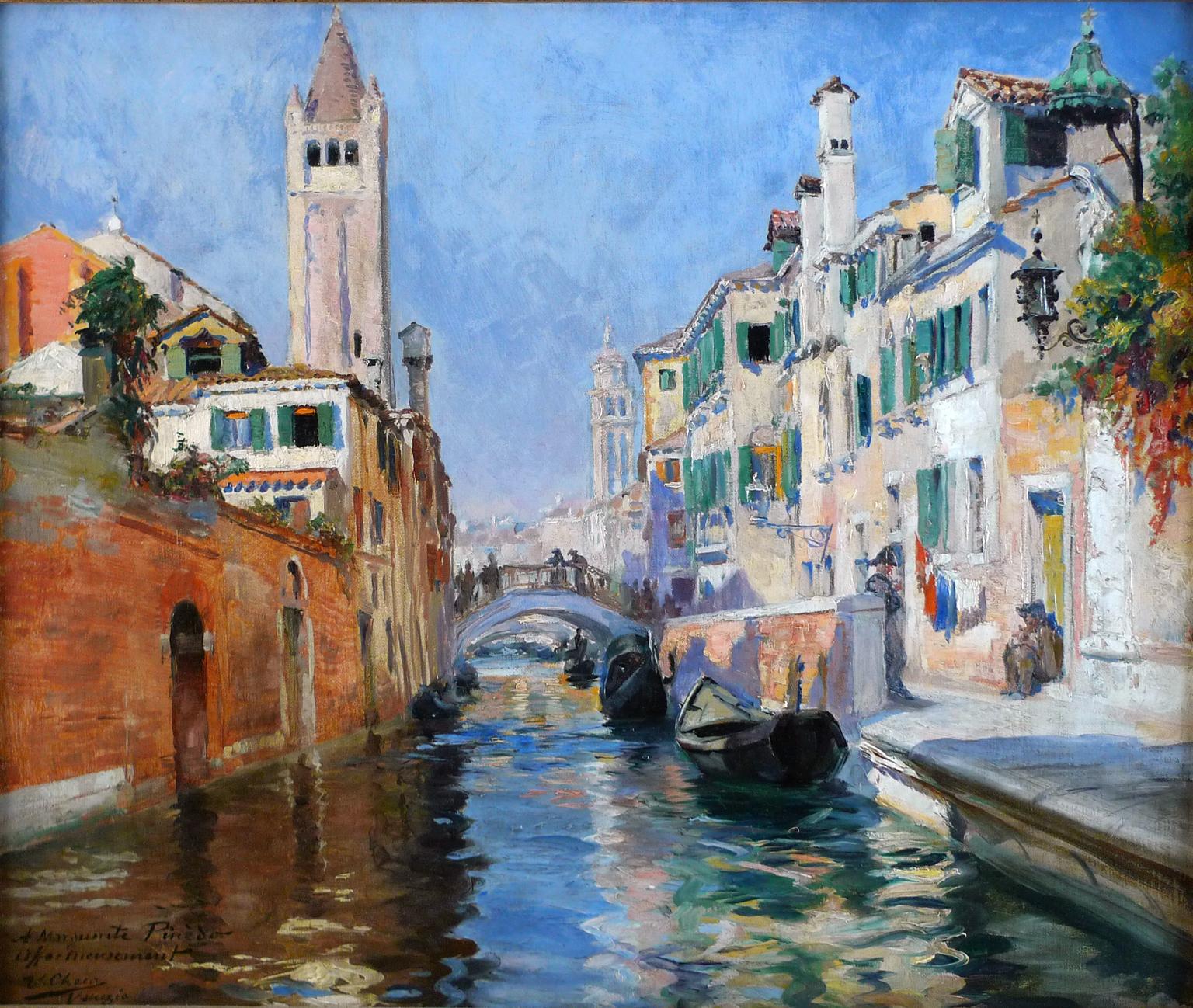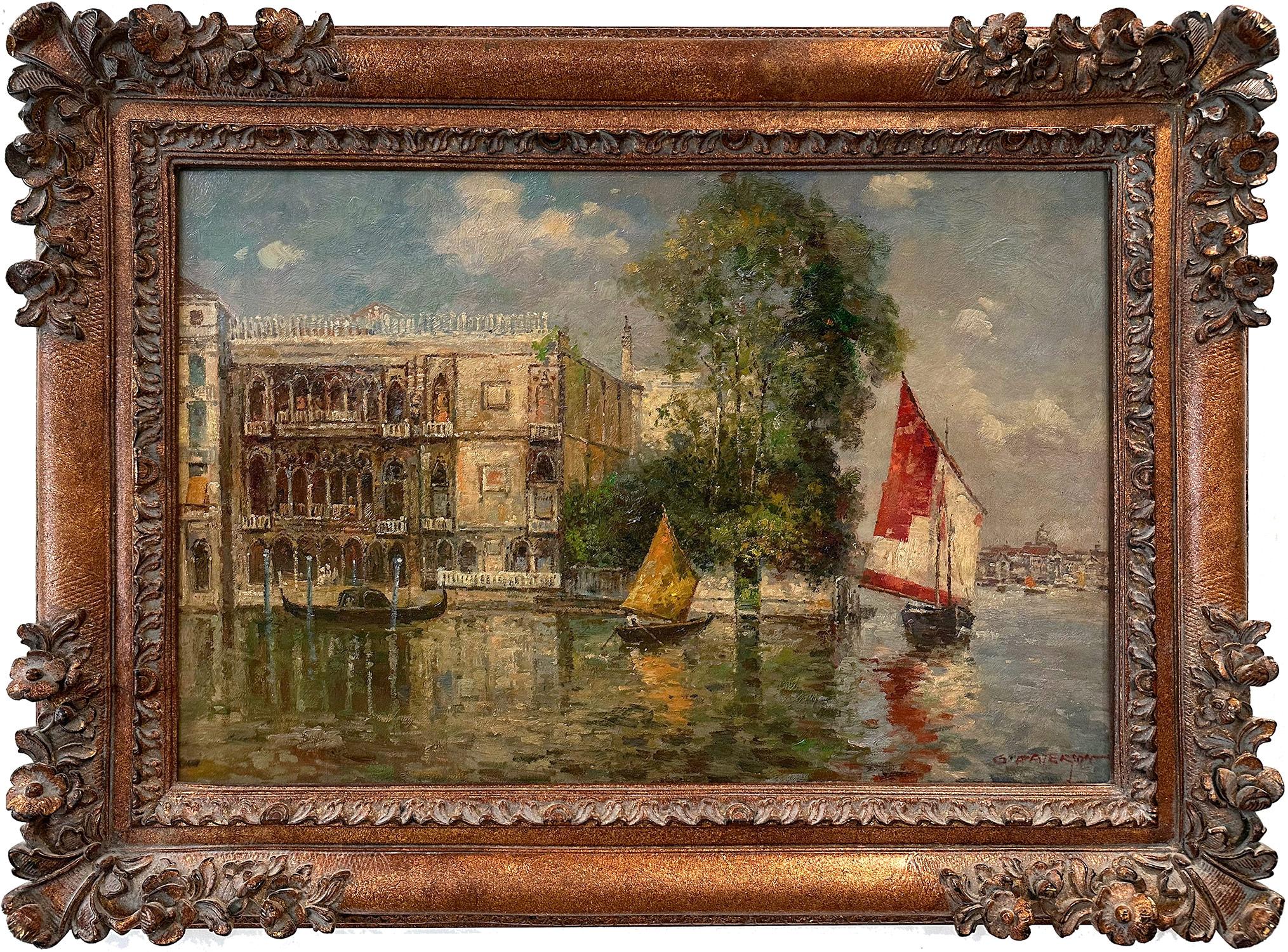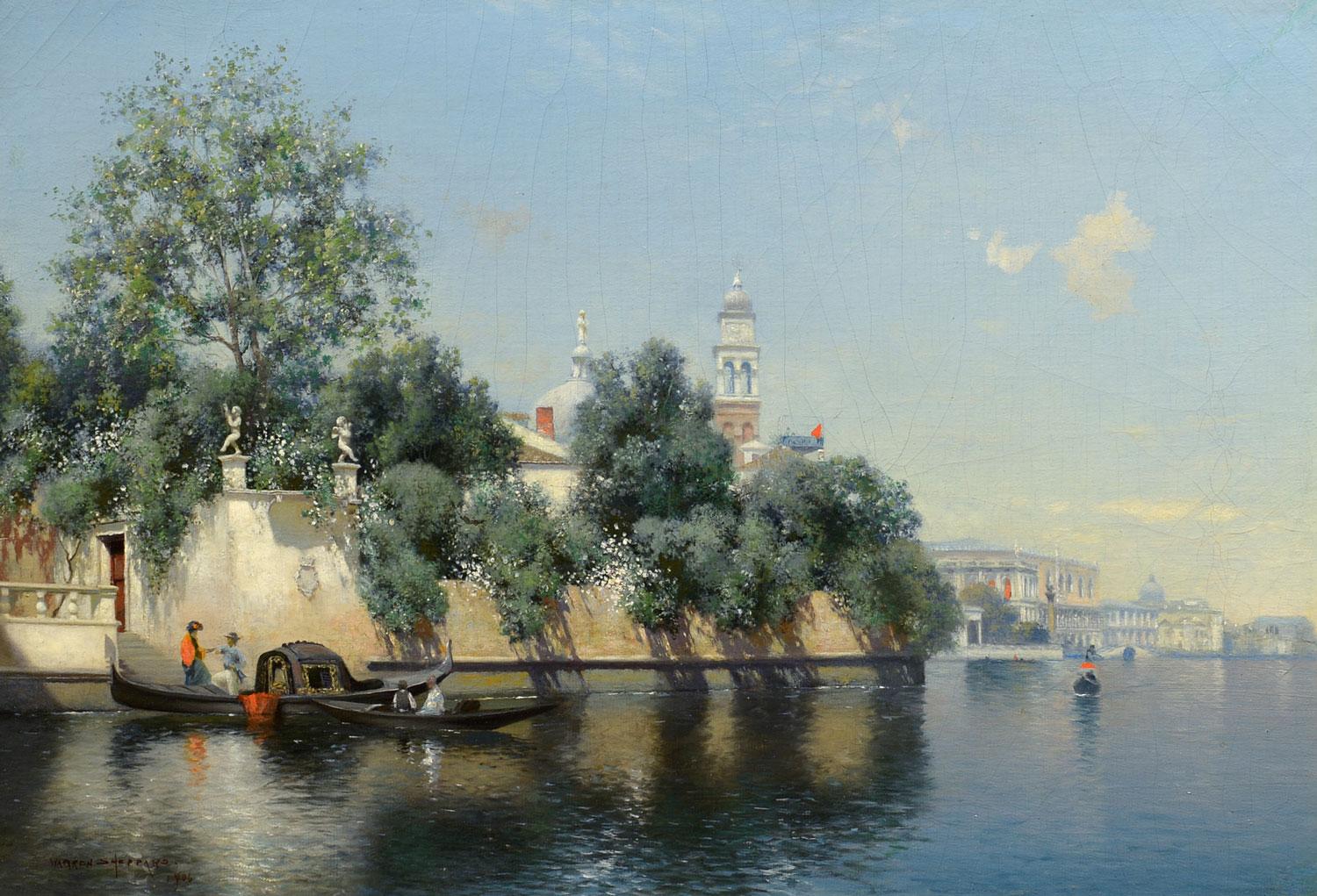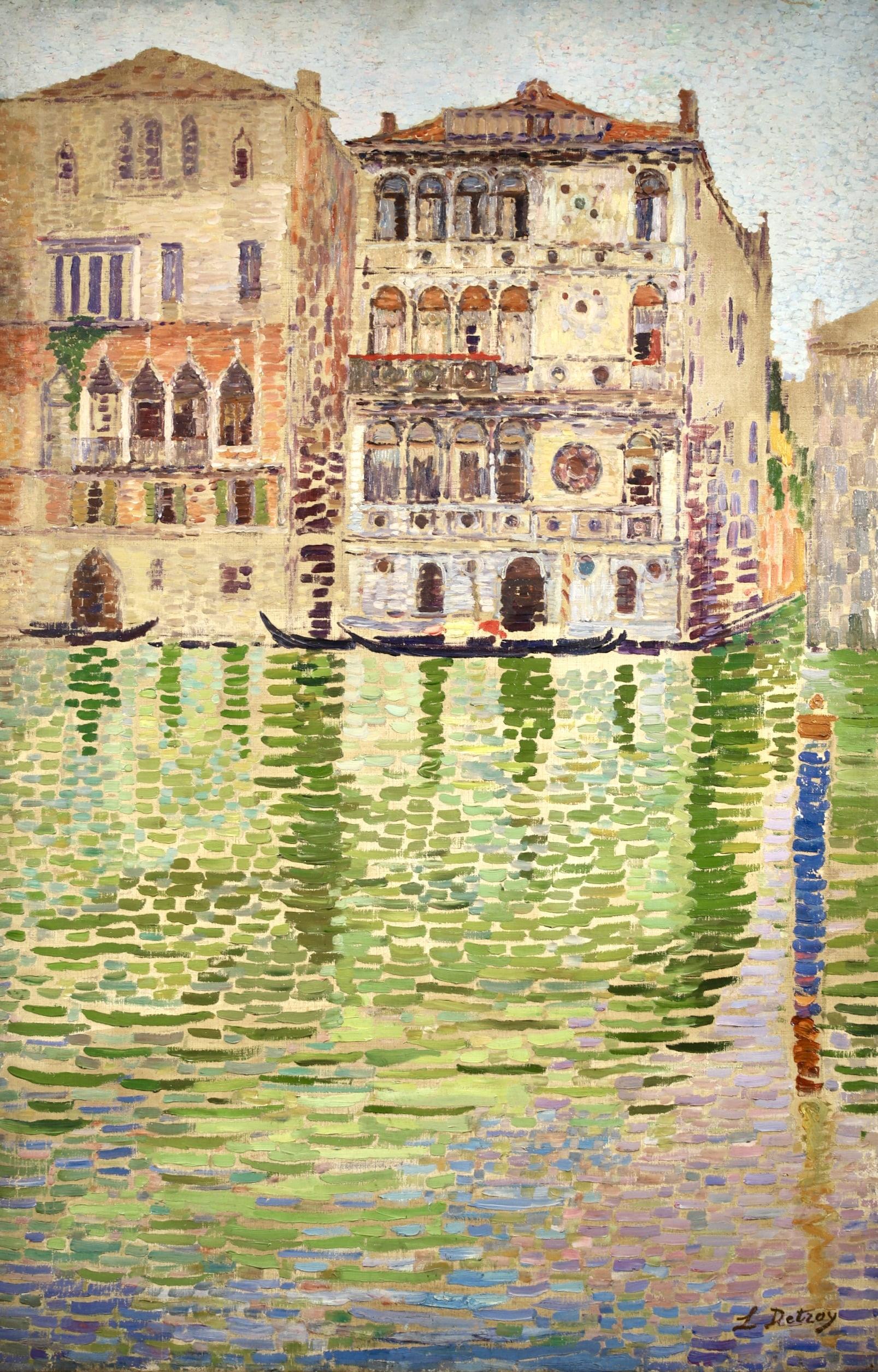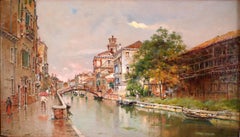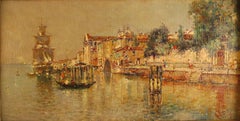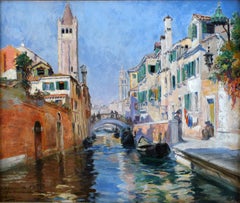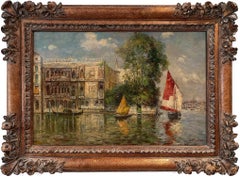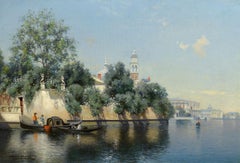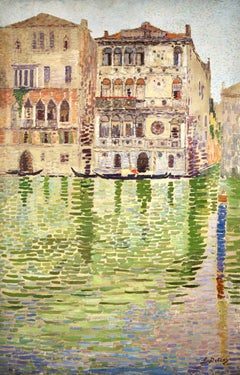Items Similar to "Ca' d' Oro, Venice" Late 19th Century Oil on Canvas of Venice, by Antonio Reyna
Want more images or videos?
Request additional images or videos from the seller
1 of 16
Antonio Reyna Manescau"Ca' d' Oro, Venice" Late 19th Century Oil on Canvas of Venice, by Antonio ReynaCirca 1900
Circa 1900
$29,822.78
£22,048.37
€25,000
CA$41,020.79
A$45,597.16
CHF 23,901.05
MX$556,851.59
NOK 298,390.84
SEK 280,730.11
DKK 190,324.58
About the Item
ANTONIO REYNA MANESCAU
Spanish, 1859 - 1937
CA' D' ORO, VENICE
signed & located "A. Reyna, Venezia" (lower right)
oil on canvas
11-1/2 x 19-3/4 inches (29 X 50cm.)
framed: 18-1/4 X 26-1/4 inches (46 X 66.5 cm.)
PROVENANCE
Private Collector, Madrid
In this work Reyna makes a great demonstration of his skill and ability to draw. With a thorough and precise brushstroke he paints this magnificent Venetian Gothic palace.
Its marble traces of the 1st and 2nd floor and the colonnade announces the change of style to the Renaissance. Also the cornice of graceful and delicate forms of local Venetian taste. In the restlessness of the calm waters of the canal, the ocher and golden luminous details of the palace are reflected, framing all the work a soft and liminous light.
Antonio Reyna Manescau (5 December 1859 - 3 February 1937), was a Spanish painter that developed most of his career in Italy. A member of the Málaga School of Painting, he studied under Bernardo Ferrándiz and alongside Moreno Carbonero. He moved to Italy in his early 20's, where he was further influenced by Italian and Spanish expatriate artists, and where he lived for the rest of his life.
After his first visit to Venice in 1885, he specialized in landscape painting. He is widely known for the preciosity of his Venetian vedutas, the importance he places in the accurate depiction of architectural detail and his mastery of color. Among his most important works are his numerous views of the Venetian canals and Piazza San Marco.
Born in the town of Coín (Málaga), he was one of ten children (six of which died in childhood) of Francisco Reyna Zayas (1825-1892) and Matilde Manescau y Otsman (1823-1910). His parents enjoyed a good social standing, being his uncle José Reyna Zayas mayor of Coín while Antonio was a child
Being still a little boy Antonio showed a great ability for drawing. Although he continued living in Coín for the rest of his childhood, he began his artistic training at the School of Fine Arts in Malaga, where he was taught by Joaquín Martínez de la Vega, first, and then by Bernardo Ferrándiz, founder of the Málaga School of Painting. He studied alongside future master José Moreno Carbonero, who was just a year older than him. From a young age he exhibited his works regularly, standing out in the local artistic environment for his use of colors, the attractiveness of his compositions and the agility of his brushwork. In 1880, at age 20, he sold his first important work for the town hall of Coín.
In 1882 he received a scholarship from the Provincial Council to further his art studies in Italy. He moved to Rome (where he was to live until his death), and in 1885 visited Venice; from that year on, Venetian landscapes, showing landmarks like the Grand Canal and Piazza San Marco but also less known quarters of the city, are ubiquitous in his work. Venice was at that time an artistic hub for Spanish painters, thanks in part to Fortuny's widow residing there, and also because of the Venetian production of Villegas Cordero and Martín Rico, whose preciosity in the depiction of the landscape was adopted by Reyna Manescau.
Although his scholarship was supposed to finish in 1886, he was captivated by Italy and remained there. In Rome he frequently visited the workshop of Villegas Cordero, like so many other Spaniards, and under his influence he produced some oriental paintings. At the same time, as a member of the Spanish colony, he was a regular in tertulias in the Café El Greco. In 1889 he married the opera singer Beatriz Mililotti Desantis, then 20, and settled to live in Rome.
Canal in Venice. Museum of Fine Arts, Boston.
Influenced by classical antiquity, by the mid 1880s he painted his lost masterwork Floralia, a classical scene that represents the annual festival celebrated in honor of the mythical goddess
Reyna Manescau's works are represented at museums such as the Boston Museum of Fine Arts, the Hermitage Museum, the Carmen Thyssen Museum and the Málaga Museum, and are also present in various private collections.
- Creator:Antonio Reyna Manescau (1859 - 1937)
- Creation Year:Circa 1900
- Dimensions:Height: 11.42 in (29 cm)Width: 19.69 in (50 cm)
- More Editions & Sizes:29 X 50 cmPrice: $29,823
- Medium:
- Movement & Style:
- Period:
- Condition:
- Gallery Location:Madrid, ES
- Reference Number:1stDibs: LU128115176512
About the Seller
5.0
Vetted Professional Seller
Every seller passes strict standards for authenticity and reliability
Established in 1977
1stDibs seller since 2019
21 sales on 1stDibs
Typical response time: 2 hours
- ShippingRetrieving quote...Shipping from: Madrid, Spain
- Return Policy
Authenticity Guarantee
In the unlikely event there’s an issue with an item’s authenticity, contact us within 1 year for a full refund. DetailsMoney-Back Guarantee
If your item is not as described, is damaged in transit, or does not arrive, contact us within 7 days for a full refund. Details24-Hour Cancellation
You have a 24-hour grace period in which to reconsider your purchase, with no questions asked.Vetted Professional Sellers
Our world-class sellers must adhere to strict standards for service and quality, maintaining the integrity of our listings.Price-Match Guarantee
If you find that a seller listed the same item for a lower price elsewhere, we’ll match it.Trusted Global Delivery
Our best-in-class carrier network provides specialized shipping options worldwide, including custom delivery.More From This Seller
View All"Venetian Canal" Late 19th Century Oil on Canvas by Spanish Artist Antonio Reyna
By Antonio Reyna Manescau
Located in Madrid, ES
ANTONIO REYNA MANESCAU
Spanish, 1859 - 1937
VENETIAN CANAL
signed & located "A. Reyna, Venezia" (lower left)
oil on canvas
11-1/2 x 19-3/4 inche...
Category
1890s Realist Landscape Paintings
Materials
Canvas, Oil
"Venetian scene", 19th Century oil on canvas laid on cardboard by Antonio Reyna
By Antonio Reyna Manescau
Located in Madrid, ES
ANTONIO REYNA MANESCAU
Spanish, 1859 - 1937
VENETIAN SCENE
signed & located "A. Reyna, Venezia" (lower right)
oil on canvas laid on cardboard
8 ...
Category
Early 1900s Realist Landscape Paintings
Materials
Canvas, Oil, Cardboard
"Venice Canal", 19th Century Oil on Canvas by Spanish Painter Ulpiano Checa
Located in Madrid, ES
ULPIANO CHECA
Spanish, 1860 - 1916
VENICE CANAL
signed & located "U. Checa" Venezia (lower left)
Also dedicated: "A Marguerite Pinédo affectueusement"
...
Category
1890s Impressionist Landscape Paintings
Materials
Canvas, Oil
Large "View of Venice", 19th Century Oil on Canvas by Karl Kaufmann
By Karl Kaufmann
Located in Madrid, ES
KARL KAUFMANN
Austrian, 1843 - 1901
VIEW OF VENICE
signed & dated "K. Kaufmann 1894" (lower right)
oil on canvas
38-3/4 x 56-1/8 inches (98 x 142 cm.)
framed: 41-1/2 x 59-1/4 inches ...
Category
1890s Naturalistic Figurative Paintings
Materials
Canvas, Oil
Large "View of The Doge's Palace Venice", 19th C. Oil on Canvas by Karl Kaufmann
By Karl Kaufmann
Located in Madrid, ES
KARL KAUFMANN
Austrian, 1843 - 1901
VIEW OF VENICE OF THE DOGE'S PALACE, VENICE
signed & dated "K. Kaufmann 1894" (lower right)
oil on canvas
38-3/4 x 56-1/8 inches (98 x 142 cm.)
fr...
Category
1890s Naturalistic Figurative Paintings
Materials
Canvas, Oil
"Saint Marks Square", 19th Century oil on canvas of Venice by Antonio Reyna
By Antonio Reyna Manescau
Located in Madrid, ES
ANTONIO REYNA MANESCAU
Spanish, 1859 - 1937
SAINT MARKS SQUARE
signed & located "A. Reyna, Venezia" (lower right)
oil on canvas
15-1/2 x 21-3/8 ...
Category
Early 1900s Realist Landscape Paintings
Materials
Canvas, Oil
You May Also Like
"View of Venice Canal" Orientalist & Impressionist Marine Oil on Canvas Painting
Located in New York, NY
A masterful oil painting depicting a view of a Venice Canal by Grace Paterson. As an Impressionist and orientalist painter, she was known for her detailed works depicting scenes from...
Category
Early 20th Century Post-Impressionist Landscape Paintings
Materials
Canvas, Oil
"Venice, 1906, " Italy, Warren W. Sheppard, Realist, Oil, Gondola, Canal
By Warren W. Sheppard
Located in Wiscasset, ME
Marine painter Warren W. Sheppard was born in Greenwich, New Jersey, to a ship captain father who instilled in his son a love and respect for the sea. He studied privately with Mauritz F. H. De Haas and took courses in drawing at Cooper Union in New York City. He traveled along the Mediterranean coast in 1879, sketching the ports of Naples, Gibraltar, Genoa and Messina. Sheppard’s foreign tours continued between 1888 and 1893, with stays in Paris and Venice, where he captured the architecture and busy canals of the Floating City. This fondness for travel also translated to his home country. He sailed along the East Coast from New Jersey to Maine in search of subjects and was an expert navigator, eventually writing the book Practical Navigation. Yacht design became a second career for Sheppard and he participated in a number of sailing competitions himself, most notably winning the New York-to-Bermuda race twice while skipper of the Tamerlane.
Sheppard exhibited at the Denver Exposition, Chicago Exposition...
Category
Early 1900s Realist Landscape Paintings
Materials
Canvas, Oil
Venice - Post Impressionist Venetian Landscape Oil Painting by Leon Detroy
By Leon Detroy
Located in Marlow, Buckinghamshire
Signed landscape oil on canvas circa 1910 by French post impressionist painter Leon Detroy. This work is painted in a divisionist style and depicts a view of gondolas on the canal in...
Category
Early 20th Century Post-Impressionist Landscape Paintings
Materials
Canvas, Oil
Venice Grand Canal Landscape Bouvard Aldine 19/20th Century Paint Oil on canvas
Located in Riva del Garda, IT
Antoine Bouvard, called Marc Aldine (L'Isere 1875 - Paris 1957)
Signed 'Bouvard' lower right
View of Venice with the Grand Canal (link)
oil on canvas
60 x 86 cm
Framed 70 x 96 cm.
Very good condition
We present an evocative view of Venice with a glimpse of the fascinating Grand Canal, signed by the famous French Vedutist Antoine Bouvard, also known by his pseudonym, Marc Aldine.
Considered one of the most talented illustrators of the lagoon city who worked there in the first part of the 20th century, he became one of the most acclaimed vedutists of that period, with a success that led him to exhibit throughout France and Italy as well as in numerous European galleries...
Category
19th Century Expressionist Paintings
Materials
Oil
$7,195 Sale Price
20% Off
A Venetian Canal Scene
Located in West Sussex, GB
Yakov Besperstov
(1929-1989)
A Venetian Canal Scene
Oil on canvas: 13 x 18in. Frame: 18 x 23 in. Circa 1970’s
Yakov Tarasovich Besperstov was a So...
Category
20th Century Impressionist Landscape Paintings
Materials
Oil, Acrylic
Venezia, contemporary oil painting of Venezia.
By Narek Arakelyan
Located in La Canada Flintridge, CA
Oil on canvas by Narek Arakelyan
Step into the romantic charm of Venice through the eyes of artist Narek Arakelyan. This captivating oil painting captures the spirit of the city — it...
Category
2010s Impressionist Landscape Paintings
Materials
Oil
More Ways To Browse
Old Masters Venice
Old Masters Paintings Of Venice
19th Century Oriental Paintings
Malaga Painting
Antique Goddess Painting
1st Century Coin
19th Century Provincial Oil Painting
Goddess Dior
Antique Spanish Coins
Venetian Coin
Antonio Reyna Manescau
Jose Ferrandiz
J Cobb
Little Italy Nyc
Scottish Highland Cattle
Sunderland Frame
W Gardner
Bluebonnets Landscape Paintings
